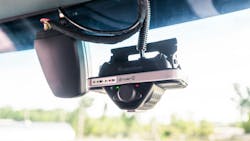Solving trucking's hostile litigation problem with technology
High turnover rates have plagued the trucking industry for years, often attributed to surface-level factors such as limited career progression, challenging work-life balance and inconsistent compensation. While these issues undoubtedly play a role, there is a deeper, often overlooked driver of trucker dissatisfaction: the hostile litigious environment in which they operate. This issue, rarely discussed openly, contributes significantly to the exodus of drivers from the industry, exacerbating the challenges fleets face and further straining the supply chain.
It's gotten so bad that in a recent American Transportation Research Institute survey, trucking stakeholders named lawsuit abuse reform the third top concern after the economy and truck parking.
What to do about it?
Let’s imagine this scenario: In the heart of a busy city, a routine delivery turns into a legal nightmare when a truck driver is involved in a collision with a vehicle that ran a red light. At first, it appeared that the truck driver would be unfairly blamed and legally liable. However, if the trucking company has the proper tools, like AI-enabled dash cameras, they can investigate immediately. Leveraging the dash cam footage, the fleet’s safety director could quickly provide compelling evidence that tracked the other vehicle in real time. The footage unequivocally proves that the other driver was at fault, leading to the truck driver’s immediate exoneration.
This hypothetical but plausible incident highlights a pivotal point: AI technology is not just a high-tech novelty but a game-changer for both truckers and insurance companies. By providing clear, unbiased evidence and real-time insights, AI can dramatically reduce litigious tensions and streamline processes, transforming challenges into opportunities for greater efficiency and fairness in the trucking industry.
Read more: Positive development: Bulk haulers turn to Netradyne for smarter camera safety
Turning legal uncertainty into reduced litigation and enhanced fleet safety
States like Louisiana have recently overturned key tort reform legislation designed to reduce insurance premiums and promote fairer legal practices in the event of an accident. These reforms were intended to create a more balanced legal environment for truckers, offering them some relief from the constant threat of litigation. However, when such policies are overruled, the consequences are severe.
The fear of being dragged into costly and time-consuming legal battles leads many drivers to leave the profession altogether. This mass exodus creates a ripple effect throughout the industry, further straining already thin fleet resources and disrupting the supply chain that keeps our economy moving.
In such a seemingly unjust environment, AI technology emerges as an unconventional yet highly effective tool for both truckers and insurance companies to relax litigious tensions.
An important development in this field is the use of AI-enabled dash cameras. These cameras provide clear and unbiased evidence in the event of an accident. They use advanced AI to analyze driving behavior in real time and assign safety scores based on factors such as speed, braking, and following distance. The cameras capture footage of incidents and provide real-time coaching to improve driver behavior. AI technology monitors drivers' facial expressions and eye movements to detect distractions and issue alerts that prompt corrective actions before an incident escalates.
These metrics provide an objective measure of a driver's performance, offering a level of transparency that benefits all stakeholders by offering a definitive account of any issues that transpire along shipping routes.
For truckers, this technology is a game-changer. It alleviates the pervasive fear of being wrongfully blamed for accidents and provides them with a sense of security on the job, knowing that they have tangible evidence to protect themselves in court. This, in turn, reduces the ongoing stress and anxiety associated with the threat of litigation, making the profession more appealing, turning the tide of driver turnover.
Read more: All AI dashcams the true winner in technology comparison study
Driver safety scores are a measurable representation of professionalism and dedication to safe driving. High scores can be used to negotiate lower insurance rates, secure better contracts, and gain recognition within companies. This not only boosts driver morale but also helps to cultivate a culture of safety within fleets, reducing the risk of accidents and legal action.
Insurance companies can also benefit from this technology because it’s a powerful tool for assessing claims more accurately and efficiently. The ability to quickly determine faults based on concrete evidence allows insurers to settle claims faster, reducing the costs associated with prolonged legal battles. Access to detailed safety data allows insurers to more accurately assess risk and tailor their policies accordingly.
Fleets with consistently high safety scores become more marketable to insurance companies, as improved driver behavior leads to fewer claims. While insurance premiums are influenced by many factors, this data-driven approach encourages safer driving practices and helps fleets stand out in the insurance market.
From supposed surveillance to positive reinforcement
AI-enabled cameras provide an opportunity to shift from punishment to positive reinforcement and gamification, significantly improving driver retention and fleet safety. By recognizing and rewarding safe behaviors like adhering to traffic laws and practicing defensive driving, carriers can create a system where drivers earn rewards, bonuses, or public recognition, encouraging better performance.
AI can track metrics such as safe driving hours and fuel efficiency, which can be translated into points, badges, or rankings on a leaderboard, fostering a competitive, engaging environment. For instance, fleets could introduce monthly safety challenges where top-performing drivers receive bonuses or recognition, enhancing their reputation and motivating peers to improve.
Focusing on positive reinforcement transforms AI-enabled dash cameras from tools of supposed surveillance into ones of support and encouragement, making drivers more likely to embrace the technology. This approach not only fosters safer driving behaviors, as drivers become more mindful of their actions, but also leads to lower insurance premiums, reduced downtime, and fewer costly repairs. Additionally, the data generated by these cameras offers valuable insights for tailoring training programs and addressing specific areas for improvement, further enhancing driver performance and demonstrating the carrier's commitment to their development and well-being.
AI technology represents a powerful tool for both truckers and insurance companies, offering innovative solutions to longstanding issues within the industry. By improving safety, enhancing transparency, and streamlining claims processes, AI helps to address the challenges of high insurance costs and litigation, ultimately benefiting the entire supply chain.
About the Author

Bobbi Farrow
Senior Manager
Bobbi Farrow is an experienced professional in the field of insurance and employee benefits, currently serving as sr manager for the Insurance Channel at Netradyne since October 2020. In this role, Farrow manages relationships with insurance brokers and companies while designing, selling, and implementing insurance programs. Prior to this, Farrow worked as a sales consultant at Allstate Benefits, overseeing a four-state sales territory and fostering key industry partnerships. Additionally, Farrow has co-owned Mogul International Real Estate and held positions, including national account executive at InfoArmor and senior account executive at NortonLifeLock, where responsibilities included managing national accounts and supporting the employee benefits team.
